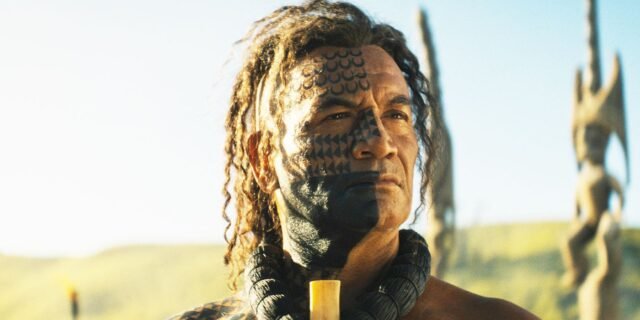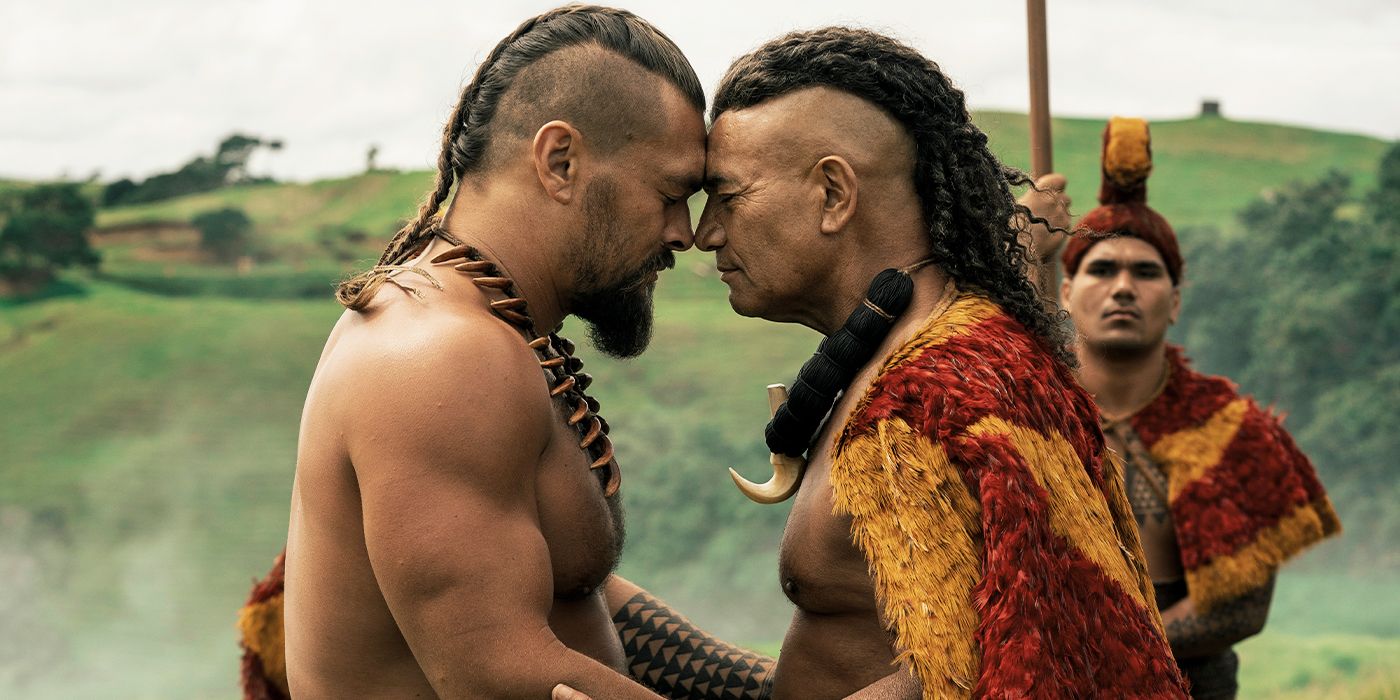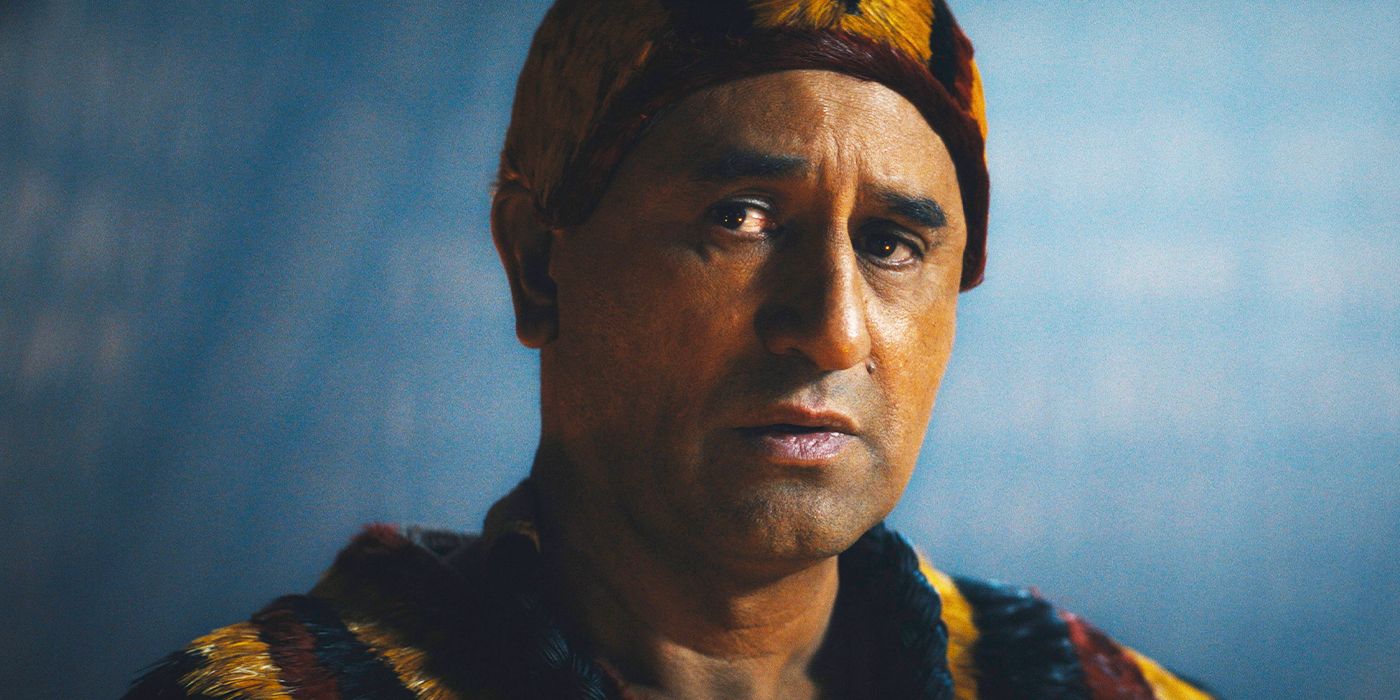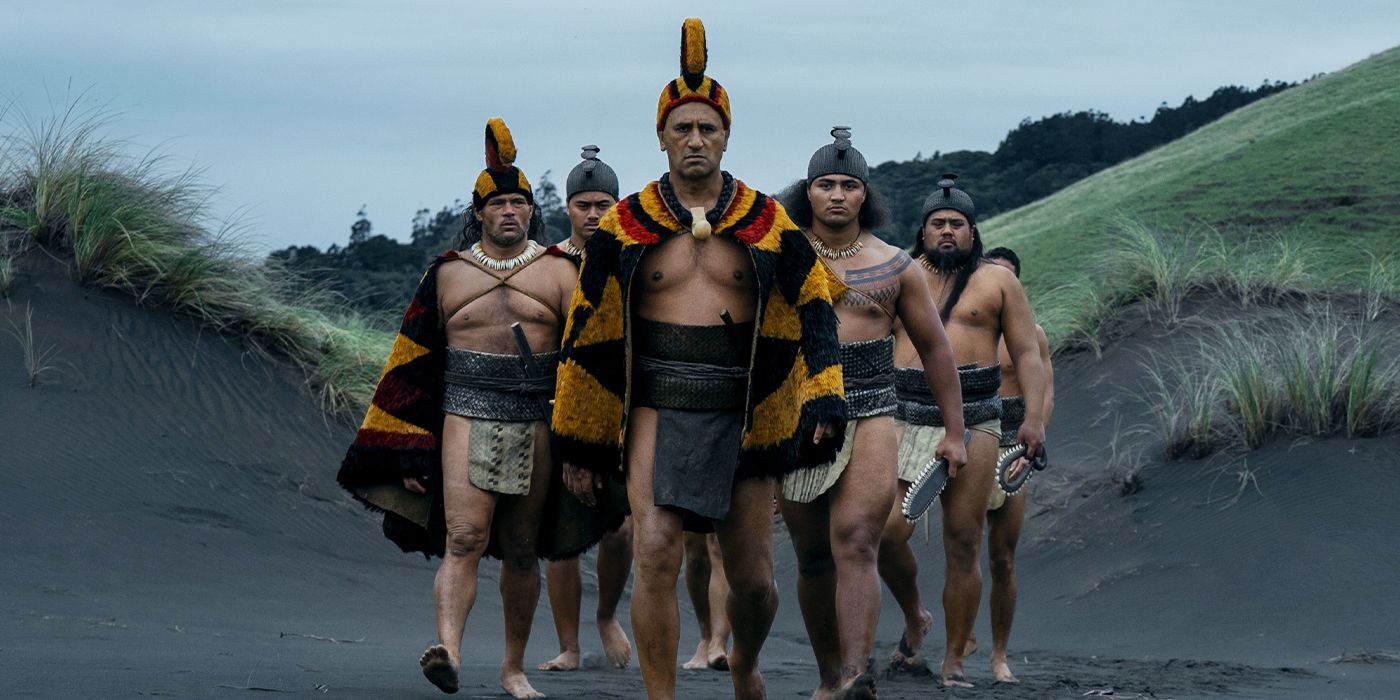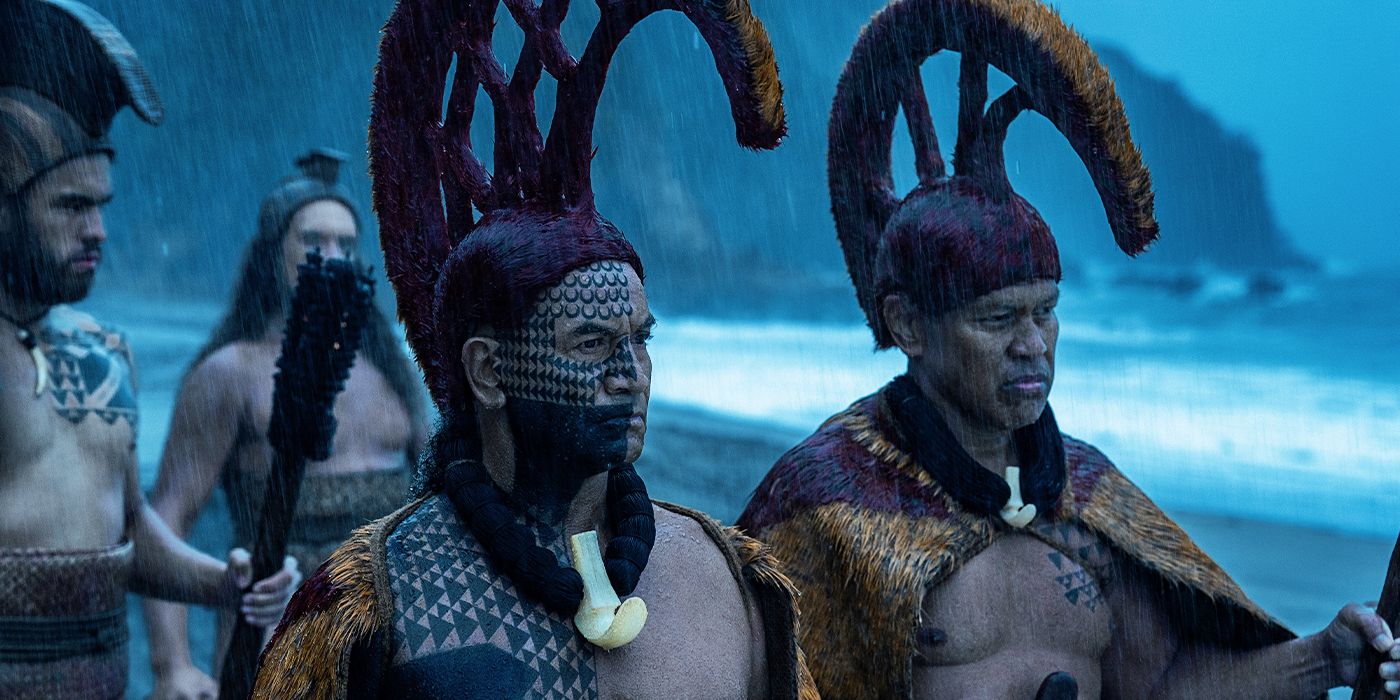Summary
- Cliff Curtis and Temuera chat with Steve Weintraub for Apple TV+’s Chief of War.
- The cast felt the weight of representing their culture, engaging in deep language and cultural preparation.
- Cliff Curtis became a co-producer, ensuring the authenticity of the series and incorporating Polynesian heritage.
Fans of period pieces, listen up! Your next favorite historical series is on its way to Apple TV+. Executive-produced, written, directed by, and starring Game of Thrones and Dune alum Jason Momoa alongside co-creator Thomas Paʻa Sibbett, the hotly anticipated Chief of War is available to stream now, with episodes releasing each Friday through September 19.
A story intent on delivering greater representation to Hawaiian culture at a time when television finally has the power and budget to do so, Chief of War is just as impressive on-screen as it is important off-screen. Momoa stars as warrior chief Ka‘iana, a man attempting to save his community from Western colonialization. Alongside Momoa in an eye-catching cast are the likes of Temuera Morrison (The Book of Boba Fett), Te Ao o Hinepehinga (Head High), Cliff Curtis (Training Day), Te Kohe Tuhaka (The Dead Lands), Brandon Finn (Inheritance), Luciane Buchanan (The Night Agent), Moses Goods (Hae Hawaii), and others.
Ahead of Chief of War‘s release, Collider’s Steve Weintraub interviewed stars Morrison and Curtis to chat about the upcoming release, with the duo discussing how it felt to see their culture and history represented on screen, the importance of using authentic Hawaiian language in the production, the difficult shooting schedule, and much more.
‘Chief of War’ Contains a Refreshingly Authentic Cast
“They cast a big net out amongst Polynesia.”
COLLIDER: I actually want to go back in time for the two of you. A lot of people won’t realize you both once were warriors. From where you started to where you are now, at what point did you feel like, “Oh, I did it?”
CLIFF CURTIS: I just followed him [pointing to Morrison]. We’re from the same town, and he was the king of kapa haka, the Māori performing arts. He comes from a lineage of great performers in our town. He’s a Morrison — his uncle, his father — and so I always had an eye on him. Then he went into film and television, and I watched him. Then he went from there, and he went to Hollywood. So I thought, if I just follow behind him, maybe I’ll be able to pick up some stuff that he leaves behind. And that’s how I got there. I followed him. It’s true. True story. You came here first. And look at him now. Now he’s the king of Hawai’i, King Kahekili, and I’m still following him around! [Laughs]
TEMUERA MORRISON: It’s been a journey. That film really impressed Jason [Momoa], too, so that’s where the relationship started. He enjoyed some of the cultural aspects of what he’s seen come out of our country. He’s watched us for a number of years now. He’s watched a number of our productions coming out. So, yeah, one never knows. I actually don’t look too far ahead. But as you said, we’re here now. This is a monumental thing for us being involved with this production.
I think Jason needed some experience around him to get the story going. They cast a big net out amongst Polynesia, so they got some really great people. We all came together like that [pulls hands together] as a family, all the cast. We all knew that we had a sense of responsibility to do the best we could with the language, to do the best we could with our performance. It wasn’t easy. You had to dig deep, and even though at the beginning I was a little scared, I’m just so glad that we’re here today and very proud to stand along [Thomas] Pa’a and Jason. This is something dear to their hearts, something that they’ve had simmering for a while, and we’ve arrived. So, I just feel like I’m one of the paddlers on this journey.
I think you two are pretty strong paddlers. I’ve watched all nine episodes, and I really want to say you guys did fantastic work. I would imagine as actors, and you sort of touched on it a little bit, the responsibility of a role like this, where you are representing a culture… Can you both talk about what it was like for you in the months or weeks leading up to the filming, what sort of pressure you felt?
CURTIS: Mostly, it was the language that was the most difficult part. Secondly is that their descendants are still living today. So, they’re walking around, and they’re even on our crew. [Gestures to Morrison] He’s got a story.
MORRISON: There was one day, my first day, one of the crew members holding the microphone said, “You’re playing my ancestor. I’m a direct descendant of Kahekili.” And it kind of dawned on me and hit me, boom, right there and then. I didn’t know what to say. I was actually dumbfounded. I guess it was just like, “I hope he doesn’t hit me with that microphone.” [Laughs]
CURTIS: Then, on the battlefield with the lava fields, we actually filmed where that battle took place in those battlefields, and the descendants of my character, Keōua, over on that side of the island of Maui, the Black Sands, are still living there today. So, I got to meet the descendants of Keōua and Kahekili.
MORRISON: Everything you said about those responsibilities really hit us. I’m still nervous about seeing it tonight.
Have you watched it yet?
MORRISON: No.
Oh, so you’re seeing it for the first time tonight?
MORRISON: First time tonight. I’ve seen a couple of the trailers.
People are going to think it’s fantastic.
‘Chief of War’ Prides Itself As an Accurate Representation of Hawaiian Culture
“It was more cultural. It was more spiritual.”
One of the things that I commend Apple for doing is that the first two episodes are not in English. They’re in…
CURTIS: Ōlelo Hawaiʻi.
I love that because it adds to makes you feel like you’re actually there rather than some bullshit, like everyone speaking English. Can you talk about that aspect?
CURTIS: I agree. I didn’t want to speak any English. My character doesn’t speak any English because I love the idea that my character is a traditionalist; he doesn’t want things to change, he doesn’t want guns, he doesn’t want their new clothes. He doesn’t want to hear anything about the New Gods or anything. So I decided I’d only speak Ōlelo Hawaiʻi.
MORRISON: I think it’s a brave move. We’ve had Crouching Tiger, Hidden Dragon, all in Chinese, but we got subtitles.
CURTIS: Shōgun, also Japanese.
MORRISON: Also, the recent screening of Shōgun, all in Japanese. They’re Japanese warriors, so it’d be stupid if they’re talking in Italian. So with this one here, it had to be in the Hawaiian language. We are Hawaiian kūpuna. We are the Hawaiian ancestors. So, it’s just amazing. But we really had to do the work. We had the language people come in and sit down with us, and we went through it bit by bit by bit by bit, and we really had to get stuck into that. Then, learning the language is one thing. Saying it sitting down and talking to you is easy, but when you’ve got your costume on, and you’re walking around…
That’s why I’m not an actor. I could never do what you two did in this series.
So you see the shooting schedule in front of you. What day do you have circled in terms of, “I cannot wait to film this,” and what day is circled in terms of, “How the F are we going to film this?”
CURTIS: I was very excited to do my scene with Temuera. We have a scene where I come to his kingdom and I sit in front of him. That was a big scene. I love that scene.
MORRISON: Yeah, I loved it, too. I love having to work with my brother again. We both come from the same town. Both had humble beginnings.
CURTIS: And then I had a big scene on the battlefield with Jason Momoa. So those were my two really big, important scenes in the season.
MORRISON: Even working with Jason, and he’s speaking his language. I’m speaking the Hawaiian language. It was more cultural. It was more spiritual. It was more coming from an organic place. My heart beats a little stronger when we’re doing our Polynesian stuff. The heart beats a stronger beat, and we’re feeling the vibe. So, quite different from Aquaman.
CURTIS: Made-up languages and made-up exotic places.
Cliff Curtis Was Involved in ‘Chief of War’ in an Unexpected Way
“To make sure we were honoring our cultural heritage.”
Is there something that each of you fought for to include with your character or in the series, and why was it important to you to fight for it?
MORRISON: No, I was pretty happy with everything. I had to draw on the narrative, and everything was good there for me. I wasn’t asking for anything too much.
CURTIS: I did. I had one thing.
MORRISON: This guy had a few things.
CURTIS: There was a scene where, to show how brutal my character was, he goes up to the volcano, and he sacrifices his wives and his daughters. I said, “This is not going to be a popular guy. I can’t imagine why you would do that.” I discussed it with Pa’a, and they took that out of the series, and instead, I sacrificed someone else. But I just didn’t think it was the right thing for a Hawaiian king to sacrifice his wife. I just didn’t think it was the right thing. We did some research and got some confirmation, because I wanted to make sure that that wasn’t just made up for dramatic effect. There was no evidence that they ever did that, so it was taken out of the show, and we replaced it with something that was more believable.
Cliff, I actually read that you became so creatively involved in the project that you became a co-producer.
CURTIS: Yeah, it’s amazing. When Jason and Pa’a invited me to assist, really, I was more of an assistant producer, to help navigate. Because we filmed as much as we could here in Hawai’i, but then we had to move production to Aotearoa, which was wonderful for us, because we needed to connect all of our Māori connections. There were many, many tribes in Aotearoa that we need to acknowledge. As we went through about 25 different tribal boundaries, we worked on different lands. So there was a lot of coordinating and speaking to these different Māori leaders and chiefs in their own right to make sure that we were honoring our cultural heritage, not just being an ignorant Hollywood production that just rolls through town and doesn’t really care less. And that was at their request. I had the foresight of Momoa and Pa’a that we did that.
Plus, we did programs training youth, Hawaiian youth, so that hopefully, not too long from now, we’ll be redundant as Hawaiians, and that we can step aside, and we can nurture other Hawaiian actors to come in and be the lead roles in all of the TV shows that shoot here. We shouldn’t just have Hawaiians in the background; we should have them being movie stars in the lead, like Jason Momoa.
MORRISON: We had a lot of protocols that Cliff had to take care of, too. So he did a great job keeping our work going along smoothly. We can’t just turn up on people’s land and do our stuff. We’ve got to clear the way first. It’s in our nature. It’s in the story. It’s in our cultural heritage. So, a fantastic job he did there. And again, even though we were making this movie, there were a whole lot of cultural exchanges on different levels. The carvings of the sets, a lot of training took place, and reinvigorating our carvers, and all that kind of thing. The waka, for example, things like that. So it was a cultural experience, as well, all around for everybody.
CURTIS: It wasn’t just a TV show. It was an interconnection of Polynesia — Tahitians, Samoans, Tongans, the Māori in Hawai’i, all connected, and even a Filipino in the cast, all coming together representing Polynesia at large. Beautiful, beautiful experience.
The first two episodes of Chief of War are available to stream on Apple TV+ now, with subsequent episodes dropping every Friday.


